Category Archives: Paying for transplants
Can’t Afford an Organ/Tissue Transplant? Where To Get Financial Aid
Posted by Bob Aronson
Introduction by Bob Aronson
Information provided by Transplant Living
and
The National Marrow Donor Program
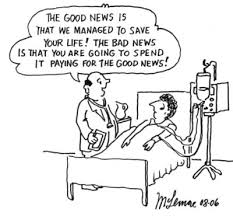 Because there is a shortage of organs the odds of getting a transplant are not good, There are a lot of factors that influence whether any one person will get an available organ and one of them is the ability to pay. Unfortunately our system is heavily weighted toward those who either have insurance or an independent ability to finance the surgery and the aftercare. A transplant and the aftercare and medication for the first year after the surgery can cost as much as a million dollars. Sometimes even those with the ability to pay need some assistance.
Because there is a shortage of organs the odds of getting a transplant are not good, There are a lot of factors that influence whether any one person will get an available organ and one of them is the ability to pay. Unfortunately our system is heavily weighted toward those who either have insurance or an independent ability to finance the surgery and the aftercare. A transplant and the aftercare and medication for the first year after the surgery can cost as much as a million dollars. Sometimes even those with the ability to pay need some assistance.
Transplant Living is a project of the United Network for Organ Sharing (UNOS), a nonprofit organization that maintains the national Organ Procurement and Transplantation Network (OPTN) under contract with the Health Resources and Services Administration of the U.S. Department of Health and Human Services.
UNOS is the private government contractor that facilities all organ transplants in the United States. The information in his blog is copies from their website which provides a wealth of information about the entire donation/transplantation process. It is one of the most comprehensive resources available. Bob’s Newheart thanks them for compiling this information and for its willingness to share it with you via our blog.
Funding Sources
Most transplant programs have social workers and financial coordinators who can help you with the financial details of your transplant. Depending on the structure at your center, one or both will help you develop a strategy.
Common funding sources to help with the costs of transplants include:
Note: This information is only a brief summary and is not intended to provide complete information. Ask your transplant financial team and your insurance provider or employee benefits officer for the latest information or help.
You or your family may have health insurance coverage through an employer or a personal policy. Although many insurance companies offer optional coverage for transplant costs, the terms and benefits of insurance vary widely. Read your policy carefully and contact your insurance company if you have questions about how much of your costs they will pay, including your lab tests, medications and follow-up care after you leave the hospital.
Some insurance questions to consider:
- Is my transplant center in-network with my insurance company?
- If my transplant center is out-of network, do I have an out-of-network benefit for transplant?
- What deductibles will apply?
- What are my co-payments for doctor visits, hospitalizations and medications?
- Does my plan require prior authorization?
- Who needs to get prior authorization?
Regardless of how much your insurance covers, you are responsible for any costs not paid by your insurance, unless you have made other arrangements. If you are responsible for paying any or all of your insurance premiums, be sure to pay them on time so that you do not lose your insurance.
Transplant center social workers and financial coordinators can also help you with the information you need. They can contact your insurance company to check on your benefits and explain your coverage in more detail.
Experimental and Investigative Procedures
If your transplant center asks you to be involved in any experimental procedures or studies, be sure to ask your center or insurance company if your insurance policy will cover the payment. It is important to know that you do not have to agree to be involved in any experimental procedures or investigational studies. If you still have questions, contact your employer’s benefits office or your state insurance commissioner.
Tips
- Keep copies of all medical bills, insurance forms and payments (or canceled checks).
- Ask your insurance company about pre-certification or using a specific provider.
- Follow the rules set forth by your insurance company so that your benefits will not be decreased.
- Always keep a log (who you talked to, date and time and questions answered) of your conversations with anyone in the hospital’s billing office or your insurance company.
- Make sure to keep your transplant center informed about your insurance, especially if you have more than one insurance company.
- For more helpful tips, see the Financial Q&A.
COBRA Extended Employer Group Coverage
If you are insured by an employer group health plan and you must leave your job or reduce your work hours, you may qualify for extended coverage through COBRA (Consolidated Omnibus Budget Reconciliation Act of 1985). This federal law requires certain group health plans to extend coverage for 18 to 36 months after benefits end. This requirement is limited to companies employing 20 or more people. You pay the full cost of the premiums for the group health plan. Learn more by contacting your employer’s benefits office or visit the federal Department of Labor Web site >
Also known as the health insurance “exchange,” the marketplace is a set of government-regulated and standardized health care plans in the United States. Open enrollment starts October 1, 2013. Coverage starts as soon as January 1, 2014. Learn more at www.healthcare.gov >
Medicare is a federal health insurance program available to people who are 65 or older, disabled or have end stage renal disease (ESRD).
Medicare, like most private insurance plans, does not always pay 100% of your medical expenses. In most cases, it pays hospitals and health providers according to a fixed fee schedule, which may be less than the actual cost. You must pay deductibles and other expenses. Medicare currently offers coverage for transplant of:
- kidneys
- kidney-pancreas
- pancreas, either after a kidney transplant or for certain indications
If you already have Medicare due to age or disability, Medicare also covers other transplants:
- heart, in certain circumstances
- lung
- heart-lung
- liver, including transplants necessitated by hepatocellular carcinoma (HCC)
- intestines
To receive full Medicare benefits for a transplant, you must go to a Medicare-approved transplant program. These programs meet Medicare criteria for the number of transplants they perform and the quality of patient outcomes.
If you have questions about Medicare eligibility, benefits, or transplant programs, contact your local Social Security office, or Medicare at 800-633-4227 or www.medicare.gov.
Medicare Prescription Drug Plans
Medicare Part D covers costs for prescription drugs. To get this coverage you must choose and join a Medicare drug plan. For more information call (800) MEDICARE ([800] 633-4227)/ TTY: (877) 486-2048 or visit www.medicare.gov (click on Medicare Basics >Part D).
Many people on Medicare also choose to buy a private “Medigap” policy to pay for costs not covered by Medicare. Check with a local insurance agent or go to www.medicare.gov (click on Resource Locator>Medigap).
State Health Insurance Assistance Program
The State Health Insurance Assistance Program (SHIP) is a national program that offers one-on-one counseling and assistance to people with Medicare and their families. Your transplant social worker or financial coordinator can provide information on your state�s SHIP program, or learn more now >
Medicaid is a federal and state government health insurance program for certain low-income individuals. Each state determines criteria for:
- eligibility
- benefits
- reimbursement rates
Most Medicaid programs only cover transplants performed in their state, unless there are no centers that can transplant that organ. For more information, contact your local human services department or the financial coordinator at your transplant center.
Charitable organizations offer a range of support, from providing information about diseases, organs and transplants, to encouraging research into these diseases and treatments.
Also, although it is very unlikely that one organization can cover all of the costs for an individual patient, some organizations provide limited financial assistance through grants and direct funding. For example, an organization may only be able to help with direct transplant costs, food and lodging or medication costs.
Advocacy organizations advise transplant patients on financial matters. If you agree to a financial arrangement with an advocacy organization, it is important to make sure that the funds are available in a manner that suits your needs. You may even want legal assistance in reviewing a written agreement before signing. Your bank can also help you review the arrangement.
Every advocacy organization should be able to provide supporting information and background documentation to prove they are legally recognized to help those in need. Brochures and other background information should never serve as substitutes for these documents. Ask advocacy organizations to provide you with copies of the following documents:
- a current federal or state certification as a charitable, non-profit organization
- a current by-laws, constitution and/or articles of incorporation
- a financial statement for the preceding year, preferably one that
- an audit report from an independent organization
- references
Public fundraising is often used to help cover transplant expenses not paid by medical insurance. Before you begin seeking donations, it may be necessary to check with your city/county governments, legal advisor or transplant team about the many legal and financial laws and guidelines.
If you decide to use public fundraising as a way to cover your expenses, you may want to contact local newspapers, radio or television stations to help support your cause. In addition, try to enlist the support of local merchants and other sponsors to promote or contribute to your events. Your friends, neighbors, religious groups, local chapters of volunteer or service groups and other community groups may also be able to help.
It is also very important to understand that the funds you raise only be used for your transplant-related expenses and donated money sometimes has to be counted as taxable income. In cases in which money must be counted as income, you may lose your Medicaid eligibility.
TRICARE (formerly Champus) and Veterans Administration
Government funding for families of active-duty, retired, or deceased military personnel may be available through TRICARE. TRICARE standard may share the cost of most organ transplants and combinations. TRICARE also covers living donor kidney, liver, and lung transplants. Patients must receive pre-authorization from the TRICARE medical director and meet TRICARE selection criteria. Pre-authorization is based on a narrative summary submitted by the attending transplant physician. For more information about TRICARE, contact the health benefits advisor at your nearest military health care facility, call the TRICARE Benefits Service Branch at (303) 676-3526 or learn more now >
The National Marrow Donor Program is also a resource for information on where to get financial assistance. They offer this advice.
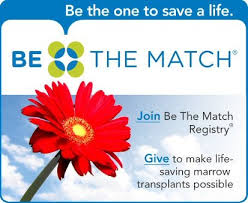 Transplant insurance coverage. These items may not be covered by your insurance. Check to be sure.
Transplant insurance coverage. These items may not be covered by your insurance. Check to be sure.
You or someone you know might need an organ/tissue transplant you must show an ability to pay before you will be accepted by most transplant centers. Most people rely on insurance but insurance policies differ from one company to the next. Be sure about what your policy covers, talk to your plans benefits manager or to the hospital social worker to get a clear idea of what is covered.
It is very likely that the following items are NOT COVERED by your health insurance company. This information was generated by the National Marrow Donor Program. http://tinyurl.com/b8pb4s4
You may want to ask if the following items are covered by your specific health insurance plan:
- Testing to find a matched unrelated or related donor
- Donor costs
- Transplants for a rare diagnosis
- Travel and lodging expenses to and from the transplant center for patient and/or caregiver
- Food costs while staying near transplant center
- Parking costs
- Prescriptions for post-transplant discharge or outpatient medications
- Office visits coverage
- Home health care
- Psychiatric coverage
- IV injections
- Clinical trials
- Sperm/egg storage
- Insurance premiums when patient is not employed
- Fees for post-transplant home preparation (carpet and drapery cleaning, replacing filters on heaters, air conditioning cleaning)
- Change in cost of living after transplant (different food needs, for example)
- Child-care costs
If your insurance does not cover all of your costs related to transplant, you may be eligible for Financial Assistance for Transplant Patients.
Financial assistance for transplant patients
Financial assistance resources may be available to you, if your insurance does not cover all of the costs related to your bone marrow or cord blood transplant. Your transplant center social worker will help you find financial aid that is available through Be The Match® and other organizations.
If insurance does not cover all of the costs related to your bone marrow or cord blood transplant, financial assistance resources may be available to you.
Applying for financial aid programs may include many steps. Your transplant center social worker will help you find financial aid that is available through Be The Match® and other organizations, and help you complete the applications.
Be The Match financial aid programs
Be The Match financial assistance is available for patients who are searching for a donor on the Be The Match Registry®, or who have had a bone marrow or cord blood transplant with a donor from the registry. Financial assistance from these programs can help you pay for the cost of a donor search and for some post-transplant expenses. Talk with your transplant center financial coordinator to see if you are eligible for these programs.
*Funds for financial aid programs are available through the generous contributions to Be The Match.
Transplant costs worksheet can help you calculate the transplant costs not covered by insurance.
Search Assistance Funds
Search Assistance Funds can help pay the costs not covered by insurance for searching Be The Match Registry of unrelated adult donors and cord blood units. If you are eligible, Be The Match will notify the transplant center. This allows your donor search process to begin as quickly as possible.
To be eligible:
- You are searching for an unrelated donor or cord blood unit from the Be The Match Registry.
- Your transplant center has determined you do not have enough insurance coverage to cover the donor search costs.
- You must be a U.S. resident.
Transplant Support Assistance Funds
Transplant Support Assistance Funds help pay for some costs during the first 12 months after transplant that are not covered by your insurance. These funds can be helpful with costs related to:
- Temporary housing, if you and your family or caregiver need to relocate for the transplant.
- Food for you and your family or caregiver.
- Parking and gas for ground transportation.
- Co-pays for prescriptions and clinic visits.
To be eligible:
- You have had a transplant using an unrelated donor or cord blood unit from the Be The Match Registry.
- You must be within the first 12 months of your transplant.
- You meet financial eligibility criteria.
- You must be a U.S. resident.

ExploreBMT is a resource to connect you and your family with financial support and information from organizations you can trust.
Other financial aid programs
There are several more financial aid programs available to help you with your transplant costs. Ask your transplant center social worker to help you identify and apply for programs that you may be eligible for, including Be The Match financial aid programs.
Fundraising
Even if you have coverage for transplant, fundraising is a good path to take to assist with costs not covered by insurance, such as prescriptions and temporary housing. It is also a great way for your family and friends to be involved with your care.
Asking for help is perfectly okay, and you may find that many of your loved ones will step forward to support your fundraising campaign. If you do decide to raise funds, it is best to do it before your transplant, as the money raised will help you budget for your medical expenses.
These organizations can help you plan your fundraising campaign:
Children’s Organ Transplant Association (COTA)
Help HOPE Live (Formerly the National Transplant Assistance Fund (NTAF)
National Foundation for Transplants
-0-
 Bob Aronson is a 2007 heart transplant recipient, the founder and primary author of the blogs on this site and the founder of Facebook’s over 3,000 member Organ Transplant Initiative group.
Bob Aronson is a 2007 heart transplant recipient, the founder and primary author of the blogs on this site and the founder of Facebook’s over 3,000 member Organ Transplant Initiative group.
Now retired and living in Jacksonville, Florida with his wife Robin he spends his time advocating for patients with end stage diseases and for organ recipients. He is also active in helping his wife with her art business at art festivals and on her Rockin Robin Prints site on Etsy.
Bob is a former journalist, Governor’s Communication Director and international communications consultant.
A Proposal To Legalize the Sale of Human Organs
Posted by Bob Aronson
By Bob Aronson
Plan by David F. Diamond
The story of the organ shortage is all too familiar; supply just can’t catch demand.
Since 1984 when Tennessee Congressman Al Gore (D) and Utah Senator Orin Hatch (R) authored and passed the National Organ Transplant Act (NOTA) there have not been enough organs. The act makes “Altruistic” donation the law of the land simply meaning that patients who need transplants must depend on the good will of others who upon their deaths will voluntarily donate their organs.
After nearly 30 years only 40% of Americans have shown that good will by registering as organ donors. If the goal was to provide organs for all who needed them then the experiment failed. I cannot believe that either Gore or Hatch would have supported a plan that would allow thousands to die.
Today there are about 120,000 people on the national transplant list and so far in the first 7 months of this year there have been only 11,600 transplants done. Obviously the system isn’t working the way Gore and Hatch had hoped.
So what to do? There have been scores of proposals put forward to change the law. Proposals which include “Opt-out” or “Presumed consent” which means everyone would automatically be considered an organ donor unless they chose to “Opt Out” (our current system is “Opt In”). Also proposed are programs that would offer transplants only to registered organ donors; mandatory donation; compensation of sorts that would pay funeral expenses or perhaps provide scholarships and outright commercial sales of human organs. All of those options have been discussed by lawmakers, medical ethicists and the people who run the national transplant program and they have all been dismissed as unethical, unmanageable or just plain unworkable and people continue to die.
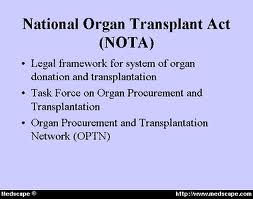 When NOTA was established the authors made it quite clear that organ sales would not be allowed. NOTA specifically states “it shall be unlawful for any person to knowingly acquire, receive, or otherwise transfer any human organ for valuable consideration for use in human transplantation if the transfer affects interstate commerce.” The penalty of breaking this law is a fine of $50,000 or up to five years in prison, or both, So that readers have accurate information before them, here is that section of NOTA:
When NOTA was established the authors made it quite clear that organ sales would not be allowed. NOTA specifically states “it shall be unlawful for any person to knowingly acquire, receive, or otherwise transfer any human organ for valuable consideration for use in human transplantation if the transfer affects interstate commerce.” The penalty of breaking this law is a fine of $50,000 or up to five years in prison, or both, So that readers have accurate information before them, here is that section of NOTA:
From the National Organ Transplant Act of 1984, as amended through February 1, 2010:
TITLE 42 > CHAPTER 6A > SUBCHAPTER II > Part H > § 274e
Prohibition of organ purchases
(a) Prohibition

It shall be unlawful for any person to knowingly acquire, receive, or otherwise transfer any human organ for valuable consideration for use in human transplantation if the transfer affects interstate commerce. The preceding sentence does not apply with respect to human organ paired donation.
(b) Penalties
Any person who violates subsection (a) of this section shall be fined not more than $50,000 or imprisoned not more than five years, or both.
(c) Definitions
For purposes of subsection (a) of this section:
(1) The term “human organ” means the human (including fetal) kidney, liver, heart, lung, pancreas, bone marrow, cornea, eye, bone, and skin or any subpart thereof and any other human organ (or any subpart thereof, including that derived from a fetus) specified by the Secretary of Health and Human Services by regulation.
(2) The term “valuable consideration” does not include the reasonable payments associated with the removal, transportation, implantation, processing, preservation, quality control, and storage of a human organ or the expenses of travel, housing, and lost wages incurred by the donor of a human organ in connection with the donation of the organ.
For the past nearly 30 years, the prohibition against buying and selling organs in the United States has been the law of the land. Efforts to provide financial incentives as a means of increasing deceased donation, for example, have failed because of what was determined as clear Congressional intent that organs not be placed in a commercial market.
When you consider the strong language in NOTA with regard to organ sales one would think the debate would be dead. Well, it’s not and that’s because of what appears to be a contradiction in public policy. The law says one thing but we seem to practice in some cases what the law disallows.
We are prohibited from selling human organs but not hair, sperm, blood, and other “replenishable” body parts. The question of commercialization of human organs remains unsettled; not so much because of a public desire to sell their organs but rather because of the explosive growth of the biotechnology industry.
Advances in that arena have generated uses and needs for body tissues that were previously unimaginable. And there’s the rub. While the law bans the buying and selling of organs for transplantation, they have not banned their use in research, education, and commercial endeavors. So the bottom line is that you can buy body parts legally but not for transplantation.
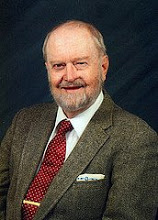 Enter David Diamond and his proposal for legalizing the sale of human organs. I met David on the internet. We share backgrounds in politics and broadcasting and in trying to save lives through organ transplantation.
Enter David Diamond and his proposal for legalizing the sale of human organs. I met David on the internet. We share backgrounds in politics and broadcasting and in trying to save lives through organ transplantation.
By publishing his proposal I am neither endorsing nor opposing it. I am posting it because I believe in an informed public and that he has the right to be heard and have his ideas discussed.
David has not had a transplant nor is he a candidate for one, he simply has an interest in the issue that began with a radio interview. Here’s David Diamonds story in his words:
“In 1984 I was doing a radio talk show in Memphis TN. My guest one day was the local director of the Organ Procurement group I asked him “Well, couldn’t people buy an organ if they wanted to?”
He answered that was illegal under the new law. The authors, he said, wanted to prevent the development of a black market.
I didn’t think to ask the logical follow-up question: “But won’t that seriously limit the supply.”
Days and weeks and months thereafter, the question nagged at me. Finally I began to develop a solution that I thought could solve the shortage. And so I talked it up for 20 plus years, getting nowhere fast! Folks didn’t want to consider or talk about such a “ghoulish” subject.
In 2008 before the Republican Presidential Primary, I had a brainstorm. I thought, “One way to get publicity for anything is to run for President of the United States but I’ll do it on just the issue of legalizing organ sales.”
Well, I did it on a shoestring and sure enough I got some publicity and even got a story in the Des Moines, Iowa paper. Unfortunately John McCain got the nomination and my plan was no longer of interest to the news media.
I say the idea is still good. I’ve tried to improve it along the way; tried to address all the obvious objections. But I’m sure I’ve missed a few. Now you get to give us your thoughts. Let’s work together and create a huge supply of organs.
The David Diamond Plan to increase the supply of transplantable organs by making the sale of human organs legal in the United States.
The Federal Organ Transplant law needs to be changed.
The Federal Organ Transplant Law enacted in 1984 provides that only donated organs may be used. The following plan to increase the supply of organs for transplant was developed in subsequent years by David F. Diamond of Memphis, Tennessee.
======0======
The shortage of organs is taking the lives of almost 7,000 people unnecessarily each year. Donation is good. It is the highest altruistic step that a person can contemplate. However, for a number of reasons, many people are not willing to donate. The solution is to provide a regulated system allowing the organs of cadavers to be sold as follows:
A. A contract can provide that when a person has decided, for whatever reasons, not to donate organs, he or she (hereafter: the provider) can commit to a plan to have the organs sold if and when the provider is brain dead. This contract will also be signed by the next of kin, spouse or nearest living relative so that that party understands the purpose of the contract and agrees that they will not oppose its implementation when the provider dies. A provider’s option to cancel the contract at any time prior to the provider’s death will be included in the contract. The use of this contract will allow the provider to leave an estate to his heirs or a designated charity. A provider, with few or no assets, might otherwise have none to leave when he or she passed.
B. The sale of organs can be conducted by a broker, attorney or individual (hereafter: an agent) designated by the provider. A licensing procedure would establish that the agent would be certified as fiscally responsible and having financial integrity. Upon determination of brain death, the agent selected by the provider, using email, fax or phones, would immediately advise interested buyers of an organ’s availability and condition, etc. Time would be of the essence, of course. Appropriate compensation to the agent, such as a commission for services provided, would be set forth in the contract. Buyers whose bids were accepted would send payment by wire transfer, cashier’s check or other means approved in the law.
C. The party designated by the provider must maintain a public record (like a broadcaster’s log which is available for public viewing) specifying the individual who gets the organs, how much is being paid and the identification of the provider. The purpose of this transparency is to eliminate the need for a black market, and to stimulate public awareness. If there is a public record, as soon as organ sales begin, the news media will undoubtedly write about it pointing out how much money was involved in the transactions and stressing how much money goes to the heirs. This will persuade a lot of additional people to agree to such a contract, thus increasing supply exponentially. Through the action of the law of supply and demand, the increased supply will cause prices to decrease to a level most people will consider reasonable. Unless you allow prices to be set by the market process you put a limit on the number of organs that might become available. Any fixed price, set by government or a special agency, would diminish the supply which would defeat the goal of making the most organs available. That would cause some individuals to decide not to participate. But if they knew that the organs they might provide are going to bring whatever the market process allows, they’ll have every incentive to take part.
D. The organs would have to be sold only for transplant to U. S. citizens in order to avoid foreigners from bidding up the price and reducing the supply to Americans. Of course, if other countries should adopt model legislation such as ours then we could reciprocate and become partners with them since their organ supply could be shared with ours.
E. The poor will not be discriminated against. They will have access to organs because the law will provide that, just as in Medicare or Medicaid presently, the government will pay for any medical procedure or supplies that the patient needs, upon a doctor’s certification that it is medically necessary. The government would buy organs on the market for those with Medicare or Medicaid unless donated organs were available. The same principle will apply for those with health insurance. And the wealthy, who may choose to be self insured, would be free to arrange for organs in the same market. Of course, people would still be free to donate organs. And participation by providers in the futures contracts would be entirely voluntary.
F. Presently those uninsured or poor, not covered by Medicare or Medicaid, have to raise tens of thousands of dollars before hospitals or transplant surgeons will help them. The added cost of an organ can also be raised in the same way, or the law can require our government to cover that cost, since it will be less costly over time than dealing with whatever the patient’s medical expenses would be otherwise.
G. The plan will require providers to have their medical records maintained by their doctors beginning at least as soon as a futures contract is signed. It would be made available immediately to any parties potentially buying an organ from that cadaver. The purpose, and the result, would be to assure a better, safer organ supply. This plan does not contemplate any sale of kidneys or parts of livers from a living person. There are risks in having such surgery and for that reason and others, we set that aside and take no position on that question. Sometimes, under current law, it is the right thing to do, depending on the circumstances. But in point of fact, the need for such organs will be adequately supplied with adoption of my plan.
=========0=========
The proposal I’m offering will be, of course, subject to improvement and modification by the federal legislature. Meanwhile, I welcome and will entertain seriously any changes so long as they do no damage to this essential requirement: We have to let the law of supply and demand work in order to maximize the number of organs that will be made available.
–
David Diamond 82, lives in Memphis, Tennessee. He is a retired TV and radio commercial spokesman, an actor, a freelance broadcast sports producer, and a marketing and public relations consultant.
Following four years of service (1953-1957) as a Russian language technician in the U.S. Air Force, Diamond studied foreign affairs at George Washington University in the late 1950’s. He also worked for Maryland state senator Newton I. Steers, Jr: as congressional and state senatorial campaign manager.
Other endeavors include:
· Serving as executive assistant and deputy commissioner in the Maryland Insurance Department;
· Legislative assistant in the state capitol in Annapolis.
· Office manager for U.S Senator Charles McC Mathias.
· News anchor for WTAE radio; radio/TV
· News director for the 1973 National Boy Scout Jamboree;
· Managed a successful congressional primary campaign for Robert Casey
· From 1982 to 1991 he was the national commercial voice for the Levitz Furniture chain.
IF THE COMMENT SECTION IS NOT VISIBLE GO TO THE TOP OF THE PAGE AND CLICK ON THE NUMBER IN THE CIRCLE IN THE RIGHT HAND CORNER AND IT WILL APPEAR OR.…you can email David F. Diamond at david.f.diamond@gmail.com or Bob Aronson at bob@baronson.org
 Bob Aronson of Bob’s Newheart is a 2007 heart transplant recipient, the founder of Facebook’s nearly 3,000 member Organ Transplant Initiative and the author of most of these donation/transplantation blogs.
Bob Aronson of Bob’s Newheart is a 2007 heart transplant recipient, the founder of Facebook’s nearly 3,000 member Organ Transplant Initiative and the author of most of these donation/transplantation blogs.
You may comment in the space provided or email your thoughts to me at bob@baronson.org. And – please spread the word about the immediate need for more organ donors. There is nothing you can do that is of greater importance. If you convince one person to be an organ and tissue donor you may save or positively affect over 60 lives. Some of those lives may be people you know and love.
Please view our music video “Dawn Anita The Gift of Life” on YouTube https://www.youtube.com/watch?v=eYFFJoHJwHs. This video is free to anyone who wants to use it and no permission is needed.
If you want to spread the word personally about organ donation, we have another PowerPoint slide show for your use free and without permission. JAgain, write to me and ask for “Life Pass It On.” I will email it to you immediately. This is NOT a stand-alone show; it needs a presenter but is professionally produced and factually sound. If you decide to use the show I will also send you a free copy of my e-book, “How to Get a Standing “O” that will help you with presentation skills. Just write to bob@baronson.org and I will send the show and book ASAP.
Also…there is more information on this blog site about other donation/transplantation issues. Additionally we would love to have you join our Facebook group, Organ Transplant Initiative (OTI). The more members we get the greater our clout with decision makers.
En Espanol
Bob Aronson de Newheart de Bob es un centro receptor de trasplante 2007, el fundador de la Iniciativa de Facebook cerca de 3.000 miembros de trasplantes de órganos y el autor de la mayoría de estos blogs de donación / trasplante.
Usted puede dejar un comentario en el espacio proporcionado o por correo electrónico a sus pensamientos a mí en bob@baronson.org. Y – por favor difundir la palabra acerca de la necesidad inmediata de más donantes de órganos. No hay nada que puedas hacer lo que es de mayor importancia. Si se convence a una persona para ser un donante de órganos y tejidos puede salvar o positivamente afectará a más de 60 vidas. Algunas de esas vidas puede haber gente que conoces y amas.
Por favor, vea nuestro video musical “Dawn Anita The Gift of Life” en YouTube https://www.youtube.com/watch?v=eYFFJoHJwHs. Este video es libre para cualquier persona que quiera usarlo y no se necesita permiso.
Si quieres correr la voz personal sobre la donación de órganos, tenemos otra presentación de PowerPoint para su uso gratuito y sin permiso. JAgain, escribir a mí y pedir “Life Pass It On.” Voy a enviar por correo electrónico a usted inmediatamente Esto no es un espectáculo independiente,. Necesita un presentador, pero es producido profesionalmente y objetivamente sonido Si usted decide utilizar el archivo. demuestro que también le enviará una copia gratuita de mi libro electrónico, “Cómo obtener un Standing” O “que le ayudará con habilidades de presentación. Sólo escribo bob@baronson.org y enviaré el programa y el libro lo antes posible.
Además … hay más información sobre este sitio de blogs de otros temas de donación / trasplante. Además, nos encantaría que te unas a nuestro grupo de Facebook, la Iniciativa de Trasplante de Órganos (OTI). Cuantos más miembros que tienen la mayor influencia en nuestra toma de decisiones.
IF THE COMMENT SECTION IS NOT VISIBLE GO TO THE TOP OF THE PAGE AND CLICK ON THE NUMBER IN THE CIRCLE IN THE RIGHT HAND CORNER AND IT WILL APPEAR OR.…you can email David F. Diamond at david.f.diamond@gmail.com or Bob Aronson at bob@baronson.org
Pay Up or Die! No Money No Transplant
Posted by Bob Aronson
I’m angry!!!. Many of our citizens are sick and dying because they can’t afford healthcare and our government is throwing money down ratholes wherever you look. In the last quarter of a century, thousands of people needing transplants have died because they could not pay for the procedure. Many of these good people were organ donors but when the time came for them to become recipients, they could not even get on the waiting list. Is that what America is about? Do we really want to say, “Sorry but no money no organ, you’ll just have to go home and die.” Actually, our nation says much the same thing to anyone who can’t afford health care. That is inexcusable! Did you know that the United States is the only industrialized nation that doesn’t guarantee healthcare as a citizen’s right? Do I sound as though I am in favor of a one-payer system – well, I am.
When suggestions are made that would end this disgraceful situation the response usually is, “It’s a raw deal but we just can’t afford to pay for everyone’s health care.” Really? How is it that we can’t afford to pay for transplants and other health care but we can pay for stupid “pork barrel” projects like Boston’s Big Dig.? According to Wikipedia http://en.wikipedia.org/wiki/Pork_barrel):
The Big Dig in Boston cost $14.6 billion (over $4 billion a mile) to place a freeway underground.” The boondoggle project resulted in criminal arrests, escalating costs, death, leaks and charges of poor execution and use of substandard materials. You can read the Wikipedia explanation to get the full story but the Big Dig is not an isolated instance. Each year we spend billions on so-called “Earmark” projects.
If we can grease the pockets of construction companies we can certainly make sure that anyone who needs a new organ can get it. Why can’t people afford transplants? The estimated costs for a heart transplant during the first post-operative year are $478,900, according to the health-care consulting firm Milliman USA. Additionally there is the enormous cost of immunosuppressant medications that organ recipients have to take for the rest of their lives. (More on transplantation costs at http://www.smu.edu/newsinfo/excerpts/cardiac-donation-ethics.html Southern Methodist University news). If you don’t have insurance or cash you will likely be sent home to die, and that’s not the hospital’s fault. Most of them spend millions each year for indigent care but they can’t pay for everyone’s treatment. This is not a hospital problem rather, it is a societal issue.
At the very least our nation should provide catastrophic insurance for its citizens so whether the catastrophe is cancer, a heart attack or an organ transplant the ability to pay would no longer be a requirement for treatment.
Please read and comment on my World Wide Issues blogs on http://blogsbybob.wordpress.com. Also…visit my Facebook site, Organ Transplant Patients, Friends and You at http://tinyurl.com/225cfh OR — my Facebook home page http://www.facebook.com/home.php
Posted in Paying for transplants
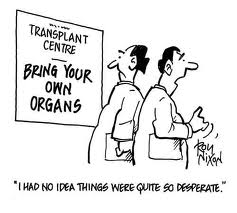
You must be logged in to post a comment.